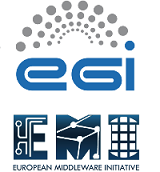Speakers
URL
http://desktopgridfederation.org
Description of the work
The workshop will focus on three aspects:
- Introduction and state-of-the-art
- User application experience
- Setting up and managing Desktop Grids
- Introduction and current state-of-the-art of using Desktop Grids in an eScience setting
- Introduction and Overview
- Best practices and Road Map to Desktop Grids (DEGISCO) tools and installation (EDGI). The Road map will include advise on all levels, from technical to policy, on how to set-up, manage and integrate Desktop Grids. Green IT aspects of Desktop Grids will be an important part of this Road Map.
-
Integration with EGI supported environments, including gLite, Unicore, KnowArc (EDGI).
-
User application experience
- User application and porting experience. This will include presentations from applications ported as part of the EDGI and DEGISCO project, but also be applications from new IDGF members. Some applications we expect to present:
---City Population Dynamics and Sustainable Growth (Yuri Gordienko)
---BNB-Grid that provides a framework for different optimization algorithms and problems. One of the examples is molecular cluster conformation problem. (Mikhail Posypkin, ISA Ras) -
A short overview of the current status of application porting (Tamas Kiss, U. of Westminster)
-
Setting up and managing (local) Desktop Grids
-
Experiences with setting up a (local) Desktop Grid. A preliminary list would include:
--- Local Desktop Grids in Ukraine, Russia, China -
Experience with connecting and using the Bridge (including new EDGI developments). A preliminary list would include:
--- Integration of Russian Desktop Grids with RDIG
--- Integration of Desktop Grids using bidirectional Bridge at ASGC Taiwan. -
Wrap up
- Where to get more information, training and support
- The benefits of IDGF membership.
Conclusions
The workshop will be organised by the International Desktop Grid Federation (IDGF) with support from the EDGI and DEGISCO projects and provides an important opportunity to further develop the Desktop Grid community inside EGI. The International Desktop Grid Federation, supported by the EDGI and DEGISCO project, will continue along this way.
Impact
Desktop Grids can be a valuable addition to the eScience infrastructure, in Europe, and world wide. By bringing together people interested in this technology with experts in a focused, practical workshop will accelerate the adoption. Ultimately it is science that is benefiting from this acceleration.
The Desktop Grid enthousiastics are organised in the International Desktop grid Federation, an open society that everyone can join. The workshop will be prepared by the IDGF, and the results will also be communicated through the IDGF channels, which will increase the impact.
On the other hand, the impact of the workshop will be increased by having it as part of the EGI User Forum. Desktop Grids only function optimally when fully integrated into the (European) e-Infrastructure. Hence, it is important to offer to current EGI users and administrators the possibility to get to know this technology and to meet with experts that could help them.
Overview
Desktop Grids can be an important addition to the eScience infrastructure. Desktop Grids can be volunteer Desktop Grids, collecting computer capacity from tens-of-thousands of PCs at home, or local Desktop Grids consisting of otherwise unused machines inside a university or institute. Applications have to be ported to these Grids.
To be of maximum benefit to scientific users, Desktop Grids have to be embedded into the standard scientific e-Infrastructure environment as provided by EGI.
The workshop will on a practical level introduce Desktop Grids, applications on Desktop Grids, and embedding into the EGI environment.
The workshop will provide a platform for scientific users, Desktop Grid operators, application developers and EGI administrators to exchange experiences.
However, it will equally be useful for those interested in getting some first hand information on practical aspects.

